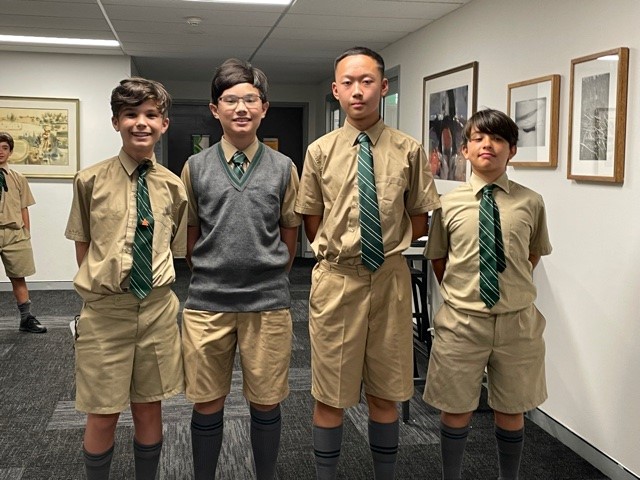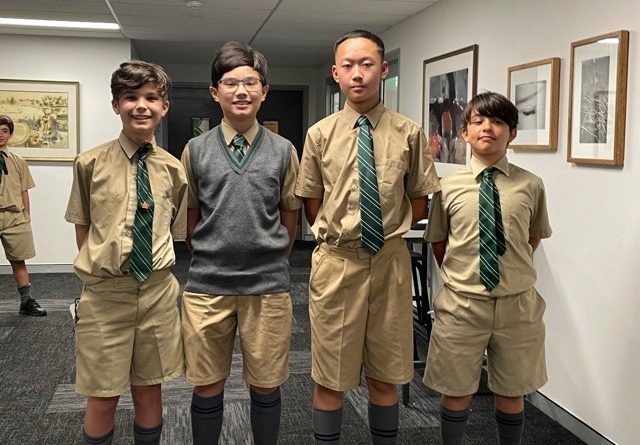Debating News | Round 6

YEAR 7 ISDA DEBATING REPORT
It was one of the most crucial debates of the season; if Trinity was able to have four greens in the results table, it would mean that we had a near 100% of making it into knockouts. Before the debate it seemed like a nervous cloud was pouring nervous rain all over us – we needed to win this. As soon as we received our topic, we raced to our prep rooms. We knew that for us to win this debate, we needed to follow the structure that our coach gave us (I will not put it here because I don’t want opposition teams stealing this golden formula).
Slowly but surely, we progressed through these steps, and we came out with an amazing golden plan. We knew exactly what each person had to do to get the optimal result. However, this did not come without arguments. We also desperately wanted the best result of the team, so each person made their own contributions to the team. This meant clashing of interests and discussion about which was the best. We were able to quickly resolve these issues by having our own mini debates. With the best points, and the best case we were confident that we could win. The topic was “That we should require social media and tech companies to collaborate with the police in ongoing investigations.”
Our substantive was the following:
1. Technology is the new platform for criminals.
2. Gaining access to a person’s phone/social media account is like a police officer searching a house with a warrant.
3. This will make our court systems much more effective and efficient.
As we walked out of our prep room, we were confident that we had this, and if we did everything that our coach told us to do, we had this. The debate started off with us as the affirmative team introducing the definition and model. Our first speaker brought up his points and finished his case. The opposition came up and responded to our case by stating how it was a breach of rights and how it was unnecessary. Though we did think that this was somewhat true, we were swift to point out that we still could improve on the status quo which was better. The second speaker of the opposition came out to strengthen their arguments on how it was a breach of rights. Our third speaker came up to end the debate with a bang, rebutting their points. Third negative then concluded the debate.
It was finished, hours and days of anxiety finally released as the debate finished.
Anxiously we waited for the result of the debate to come out. We went to our coach for some feedback, which was extremely helpful. However, there was something bigger nagging at the back of our minds: who won? Finally, for what seemed like eternity, we heard the voice of the adjudicator. Quickly we returned to our desks and listened to the comments and noted them down. Then it was time for the results, in a close but clear debate we had WON! We celebrated our victory but also noted on the multitude of things that we could have done better, such as taking the opposition at their best and more directly responding to their arguments.
We would like to congratulate the opposition for what was a very well-fought debate. We also extend our thanks to our coaches who worked tirelessly to provide us with the necessary information. We also would love to thank the parents for coming, the adjudicator for adjudicating this debate, and all the staff who made it possible. Ultimately, all the work, time and effort were definitely worth it .
Qin (7 Yo)
YEAR 7 FED A DEBATING REPORT
Last week Round 6 of the Year 7 FED-A debating team was a great success as we faced off against MLC School, with Trinity being on the negative side of the debate. The team consisted of J. Wong (7 Du), T. Henry (7 Ta) and D. Lin (7 Fo) as first, second and third speakers respectively. The topic was, “That parents should be encouraged to use GPS tracking on their children” which was based on the theme of Science and Technology.
The Trinity team’s arguments were focused on the importance of privacy and the detrimental effects cast upon the child and parent relationship. This introduces distrust and privacy issues in the home. The opposition team discussed the benefits of child safety and GPS tracking could help in those situations.
Overall, we were encouraged with a good win, but there is still much to improve on. Our coach and adjudicator mentioned that we were too defensive and that we can bring more benefits to the argument instead. Looking ahead, as all the teams in the competition improve, we will be engaging in even more challenging debates, but I am confident that this team has what it takes to do well in the competition if we work hard and follow advice from our coach.
Thank you to Mr Martin, our coach, for his efforts with our team throughout the season.
Wong (7 Du)
YEAR 9 ISDA DEBATING REPORT
Last Friday (the 25th of March), the 9ISDA Debating Team, consisting of M. Padmore (9 Mu), E. Ciarroni (9 W-J), D. Lok (9 Ke), and C. Ciarroni (9 W-J), had a close loss to St Andrew’s Cathedral School. This loss is especially important for the team, as it means that the team’s chances of making the finals series is solely riding on their next debate against Newington on April 1. The topic for the night was that Police officers should receive a harsher punishment for committing crimes. Trinity, as the Affirmative team, came out strongly with ideas about police brutality, police being role models for society, and more. However, our opponents responded quickly and effectively to these, pointing out how Police officers had the civil right to be treated the same as anyone else in a court of law- which ultimately led to the 9 ISDA team’s defeat.
Padmore (9Mu)
YEAR 10 ISDA DEBATING REPORT
Last Friday, Trinity’s 10s comprising of J. Fung (10 Ke), A. Stone (10 Ho), and S. Labbozzetta (10 St) had a tough debate in the ISDA competition against the students from St Andrew’s Cathedral School. The debate centred around the idea of plea bargains and whether they should be banned, a plea bargain being an agreement between the accused party and the government to plead guilty to receive a shortened sentence. In what turned out to be a very interesting debate, Trinity ended up arguing as the affirmative, saying we should remove them. The debate came down to a clash between morals and economic gain, where one side was arguing about the misapplied justice that plea bargains give, whilst the other argued the economic gain with a swifter moving court system with less backlog. In the end, whilst the economic and backlog points were admitted by the affirmative, (Trinity), the moral side of justice and its application in court were enough to get Trinity over the line.
Stone (10 Ke)
















